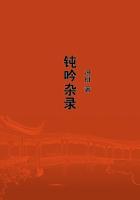(either eat the whole snail or let it quite alone); and so he went through with his laborious task, as I have done with my difficult translation.
Thus far, my lord, you see it has gone very hard with Persius. I think he cannot be allowed to stand in competition either with Juvenal or Horace. Yet, for once, I will venture to be so vain as to affirm that none of his hard metaphors or forced expressions are in my translation. But more of this in its proper place, where I shall say somewhat in particular of our general performance in ****** these two authors English. In the meantime I think myself obliged to give Persius his undoubted due, and to acquaint the world, with Casaubon, in what he has equalled and in what excelled his two competitors.
A man who is resolved to praise an author with any appearance of justice must be sure to take him on the strongest side, and where he is least liable to exceptions; he is therefore obliged to choose his mediums accordingly. Casaubon (who saw that Persius could not laugh with a becoming grace, that he was not made for jesting, and that a merry conceit was not his talent) turned his feather, like an Indian, to another light, that he might give it the better gloss.
"Moral doctrine," says he, "and urbanity or well-mannered wit are the two things which constitute the Roman satire; but of the two, that which is most essential to this poem, and is, as it were, the very soul which animates it, is the scourging of vice and exhortation to virtue." Thus wit, for a good reason, is already almost out of doors, and allowed only for an instrument--a kind of tool or a weapon, as he calls it--of which the satirist makes use in the compassing of his design. The end and aim of our three rivals is consequently the same; but by what methods they have prosecuted their intention is further to be considered. Satire is of the nature of moral philosophy, as being instructive; he therefore who instructs most usefully will carry the palm from his two antagonists. The philosophy in which Persius was educated, and which he professes through his whole book, is the Stoic--the most noble, most generous, most beneficial to humankind amongst all the sects who have given us the rules of ethics, thereby to form a severe virtue in the soul, to raise in us an undaunted courage against the assaults of fortune, to esteem as nothing the things that are without us, because they are not in our power; not to value riches, beauty, honours, fame, or health any farther than as conveniences and so many helps to living as we ought, and doing good in our generation. In short, to be always happy while we possess our minds with a good conscience, are free from the slavery of vices, and conform our actions and conversation to the rules of right reason. See here, my lord, an epitome of Epictetus, the doctrine of Zeno, and the education of our Persius; and this he expressed, not only in all his satires, but in the manner of his life. I will not lessen this commendation of the Stoic philosophy by giving you an account of some absurdities in their doctrine, and some perhaps impieties (if we consider them by the standard of Christian faith). Persius has fallen into none of them, and therefore is free from those imputations. What he teaches might be taught from pulpits with more profit to the audience than all the nice speculations of divinity and controversies concerning faith, which are more for the profit of the shepherd than for the edification of the flock. Passion, interest, ambition, and all their bloody consequences of discord and of war are banished from this doctrine. Here is nothing proposed but the quiet and tranquillity of the mind; virtue lodged at home, and afterwards diffused in her general effects to the improvement and good of humankind. And therefore I wonder not that the present Bishop of Salisbury has recommended this our author and the tenth satire of Juvenal (in his pastoral letter) to the serious perusal and practice of the divines in his diocese as the best commonplaces for their sermons, as the storehouses and magazines of moral virtues, from whence they may draw out, as they have occasion, all manner of assistance for the accomplishment of a virtuous life, which the Stoics have assigned for the great end and perfection of mankind.
Herein, then, it is that Persius has excelled both Juvenal and Horace. He sticks to his own philosophy; he shifts not sides, like Horace (who is sometimes an Epicurean, sometimes a Stoic, sometimes an Eclectic, as his present humour leads him), nor declaims, like Juvenal, against vices more like an orator than a philosopher.
Persius is everywhere the same--true to the dogmas of his master.
What he has learnt, he teaches vehemently; and what he teaches, that he practises himself. There is a spirit of sincerity in all he says; you may easily discern that he is in earnest, and is persuaded of that truth which he inculcates. In this I am of opinion that he excels Horace, who is commonly in jest, and laughs while he instructs; and is equal to Juvenal, who was as honest and serious as Persius, and more he could not be.
Hitherto I have followed Casaubon, and enlarged upon him, because I am satisfied that he says no more than truth; the rest is almost all frivolous. For he says that Horace, being the son of a tax-gatherer (or a collector, as we call it) smells everywhere of the meanness of his birth and education; his conceits are vulgar, like the subjects of his satires; that he does plebeium sepere, and writes not with that elevation which becomes a satirist; that Persius, being nobly born and of an opulent family, had likewise the advantage of a better master (Cornutus being the most learned of his time, a man of a most holy life, the chief of the Stoic sect at Rome, and not only a great philosopher, but a poet himself, and in probability a coadjutor of Persius: that as for Juvenal, he was long a declaimer, came late to poetry, and had not been much conversant in philosophy.















